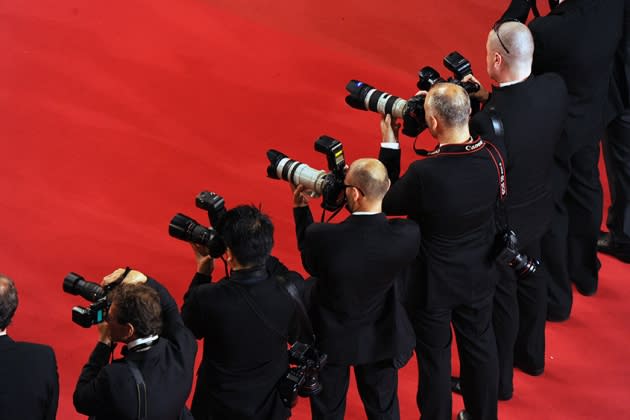Cannes Future of Cinema Panel: Lynne Ramsay, Agnes Jaoui, Abderrahmane Sissako Emphasize Diversity, Economic Injustice
- Oops!Something went wrong.Please try again later.

Guillermo del Toro and Thierry Fremaux on Wednesday resumed their colloquium on the future of cinema with leading filmmakers. The discussion shifted from anxiety about technology and streaming to the need for diversity and creativity.
After the complete absence of women on Tuesday, the Wednesday session rectified that with the inclusion of France’s Rebecca Zlotowski and the U.K.’s Lynne Ramsay.
More from Variety
'Elvis' Star Austin Butler Thrusts Hips at Cannes, Gaining 12-Minute Standing Ovation
XYZ Films Acquires Tribeca-Bound 'Huesera' for North America, Drops First Teaser, Poster (EXCLUSIVE)
Erotic Love Story '99 Moons' Wraps Further Deals for France, Italy, Japan (EXCLUSIVE)
Zlotowski quickly got into impact of the economics on film making. “You need a lot of money to represent your ideas [through cinema]. In France, we have that. But for how much longer?” she said.
And it was in that financial-creative frame that she discussed women’s role in film. “People will disappear from cinemas if you don’t offer them what they want. Audiences are not fools. We have to offer stories and be inclusive. When you play films by women they win Palmes d’Or and attract audiences,” Zlotowski said. “There is an emergency, but it is an economic urgency, not a question of morals.”
“African filmmakers don’t have the same possibilities as others, we don’t have the assurance of an audience,” said Mauritanian filmmaker Abderrahmane Sissako, explaining that financial inequality is also a diversity problem. “If cinema is to die it will do so because people don’t raise their voices, tell their stories, is not sufficiently diverse.
“We must we must react together as a family. You need a political vision. African countries don’t have the means, political vision or respect. They are neglected. [Personally] I’m not in the shadow, but I suffer from the fact that there are people who remain in the shadow. How can we create a fairer artistic world?,” Sissako said.
Ramsay, known for her unique and experimental voice, said that it feels like filmmaking in the age of streaming is becoming more difficult and that the response should be proactive.
“We have to learn to be experimental, learn to make do with smaller budgets learn new technology,” she said. “We have to keep that discipline. You have to think in different ways. Be inventive.”
Reacting to a Fremaux tease about making films slowly, the Polish-British filmmaker Pawel Pawlikowski hit back with a witty riposte. “I don’t have much to say.”
But he leaned deeper into the theme. “[These days] we are flooded with information. Every time I have an idea, I realize that I’ve already seen it ten times just last year.”
French filmmaker Agnes Jaoui also regretted modern society’s addiction to mobile phones, social media and their impact on creativity.
“Boredom gives rise to creativity. It gives access to an emotion that you wouldn’t have if you were just taking drugs or consuming content,” she said. “If I can’t be really free in cinema I’ll go somewhere else, to theater or literature. I don’t want to be told to make a product.”
Nicolas Winding Refn, who joked that he had come back from the future to speak at the colloquium, said that streaming technology offers exciting possibilities. But so does film.
“Cinema is art form that AI cannot make because it cannot cry,” he said. “I’ve been unfaithful to cinema. Five years ago, I felt it was not the same love story. The romance had gone. Since then, like Guillermo [Del Toro] I’ve created multiple shows on streaming platforms. But now I’m very excited to come back. It is almost like cinema is the underdog now.”
Best of Variety
Molly Shannon's Memoir 'Hello Molly' Is Already an Instant Bestseller on Amazon
2022 Primetime Emmys Awards Season Calendar: The Governors Balls are Back After Two Years
Sign up for Variety’s Newsletter. For the latest news, follow us on Facebook, Twitter, and Instagram.
